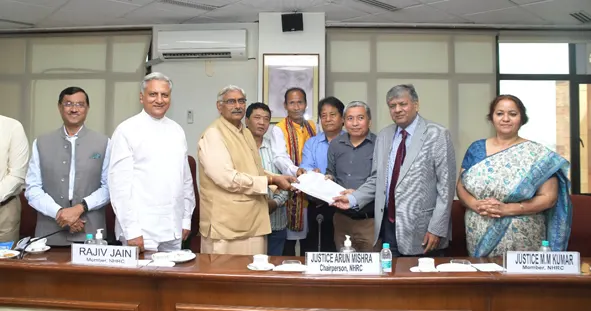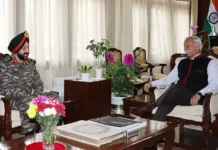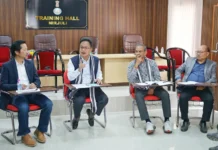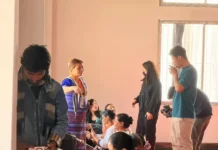[ Tongam Rina ]
ITANAGAR, 20 May: The National Human Rights Commission (NHRC) has requested the union government and the government of Arunachal Pradesh to “take appropriate action on Chakma and Hajong citizenship, as directed by the Supreme Court.”
The Supreme Court in its order dated 17 September, 2015, had directed “the government of India and the state of Arunachal Pradesh to finalise the conferment of citizenship rights on eligible Chakmas and Hajongs and also to ensure compliance of directions in judicial decisions… for protection of their life and liberty and against their discrimination in any manner, preferably within three months.”
Stating on a petition filed by Pritimoy Chakma on behalf of the Chakma and Hajong Elders’s Forum of Arunachal Pradesh and Suhas Chakma for the Chakma Development Foundation of India (CDFI) regarding non-compliance of the order passed by the Supreme Court in WP (civil) No 510/2007, the commission directed the union and the state governments to do the needful in case any part of the order of the Supreme Court still remains un-complied with and act accordingly.
The NHRC further directed that the Centre and the Arunachal government “shall take an early decision for providing the government welfare schemes to the affected persons and submit an action taken report in this regard to the commission within eight weeks.”
The two organisations had in March this year sought “extension of government social welfare schemes such as Indira Gandhi National Old Age Pension Scheme, Chief Minister Arogya Arunachal Yojana/Ayushman Bharat – Pradhan Mantri Jan Arogya Yojana, etc, to the Chakma and Hajong senior citizens who have submitted citizenship applications or will submit citizenship applications.”
The organisations also sought that the Centre process 1,798 citizenship applications already forwarded by the Arunachal government “with or without enquiry” and also direct the deputy commissioners of Changlang, Namsai and Papum Pare to forward any remaining citizenship applications of the Chakmas and Hajongs “with or without enquiry,” as per the Supreme Court judgment on NHRC vs State of Arunachal Pradesh, to the home affairs ministry.
The NHRC further noted that the “additional solicitor general has fairly stated that the government of India will earnestly take appropriate measures in the matter, granted some more time.”
Suhas Chakma, one of the petitioners and founder of the CDFI in a statement said, “The registration of the complaint by the National Human Rights Commission as the original petitioner before the Supreme Court for protection of the rights of the Chakmas and Hajongs in 1995 is a historic one and a step in the right direction to address disingenuous means adopted by the state of Arunachal Pradesh and union of India to not implement the Supreme Court judgments in the last 26 years to deny citizenship to the original migrants and further question the citizenship of their descendants and deny all the rights.”
He further said that, “when the state and non-state actors take pride for non-implementation of the Supreme Court judgments, there are serious problems whether the country itself is being governed by the rule of law.”
Chief Minister Pema Khandu had earlier said that the state government and the union government would work together on the Chakma-Hajong issue.
Addressing the people of the state on India’s 75th Independence Day, Khandu had said that “all illegal immigrant Chakmas will be moved and settled in some other places with honour, as per the constitution.”
The Chakmas and Hajongs, who were forced to flee the Chittagong Hill Tracts because of displacement following the construction of the Kaptai dam and because of religious persecution, were settled in Arunachal, starting in 1964, in designated camps in the present-day Papum Pare and Changlang districts.
Despite court orders, citizenship rights of the Chakma and Hajong settlers have been stiffly questioned and opposed by the All Arunachal Pradesh Students’ Union.





